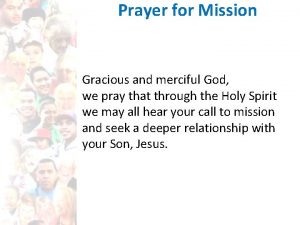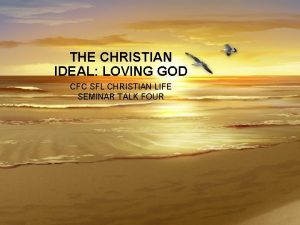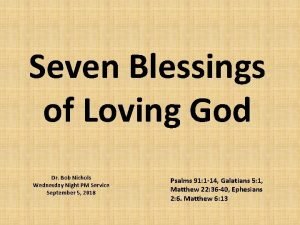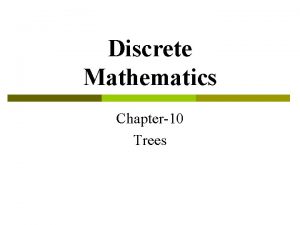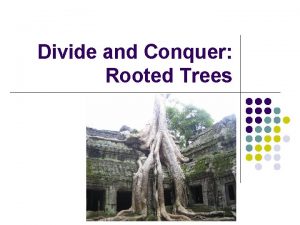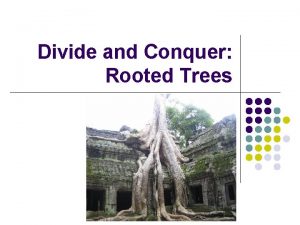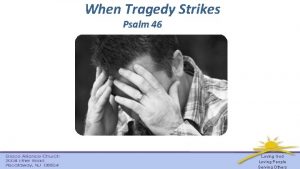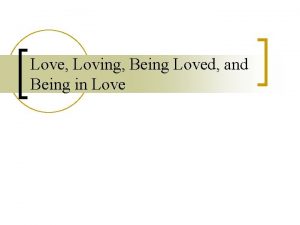LOVE OF GOD Loving God is rooted on














- Slides: 14

LOVE OF GOD

Loving God is rooted on man’s yearning to find meaning in life. Man yearns to discover his origin, nature, and purpose. This tendency of man relating himself to his creator is expressed in religion.

The Meaning of Religion Ø Ø The word comes from the Latin “religare”, or to bind back. Religion is a bond of a fellowship between man and his creator. Religion refers also to the community of believers with the hierarchy of officials. In this sense, it is called a church or a sect.

Acts of Religion Acts of religion are human acts pertaining to the practice of religion. They include: 1. 2. 3. 4. 5. Faith-act of assenting to religious truths. Devotion- acts of obedience to God’s will. Prayer-act of communicating with God. Adoration-act of proclaiming the glory of God. Sacrifice-act of binding oneself in the service of God.

Actions which are contrary to religion include: 1. 2. 3. 4. 5. Blasphemy-act of mocking God. Presumption-act of believing that God, being all loving does not punish evil. Fanaticism-excessive subservience to one’s faith. Sacrilege-act of desecrating sacred objects` Idolatry-worship of creatures other than of God.

Worship of God An act of religion is a worship of God. The worship of God is the proclamation of the glory of God, acknowledging God’s dominion over the created universe. In worship, the faithful elevates his mind and heart to God in reverence.

The worship of God consists of the duty to know him, to love him, and serve him: 1. Ø The duty to know God Man tends towards knowing God by the force of his rational nature. In reflecting upon himself, man inevitably discovers the presence of God as creator and supreme lawgiver.

2. The duty to Love God Ø We cannot love what we do not know. But knowing God does not necessarily lead to love of God. One may know a person and yet not be moved to love him. Loving God is our emotional response to presence of God.

3. The duty to Serve God Ø Serving someone is to attend to his needs. God is omnipotent and is everything. God does not need our service in the sense of a master needing a servant to give him something. However , the servant serves the master by simply obeying his wishes.

Institutional Religion Ø A group of believers, subscribing to the same faith, practices, ritual and laws, recognizing a hierarchy of officials, constitutes a sect or a church. A church has its theological doctrine as the basis of its moral teaching.

Freedom of Religious Worship Ø Our constitute provides for the freedom of religious worship. This means that the citizen is free to choose his religion. The state should not require a state religion, or pass a law prohibiting the practice of religion. The state may not interfere with the religious activity unless they disturb peace and order or constitute a criminal act.

Religious Tolerance Ø Ø One’s faith is as good as that of another. It is scandalous that some sects would criticize and deride each other. Religious tolerance is viewing someone’s religion as an error which need to be corrected.

Ecumenism Ø Ø Which seeks unity and cooperation among churches is a tangible expression of religious tolerance. Is a tacit admission that disagreement and disunity among churches is a source of scandal. The promise of unity and cooperation may not be impossible after all.

THE END !
 Love love jesus is love god greatest gift lyrics
Love love jesus is love god greatest gift lyrics God-given virtues that direct us to our loving, triune god.
God-given virtues that direct us to our loving, triune god. Justice new testament
Justice new testament Romeo ve juliet
Romeo ve juliet Our loving father prayer
Our loving father prayer Merciful and loving god prayer
Merciful and loving god prayer If god were loving there would be no suffering
If god were loving there would be no suffering Christian ideal
Christian ideal Blessings of loving god
Blessings of loving god 2. 'foresight is deeply rooted within intuitive mind
2. 'foresight is deeply rooted within intuitive mind What is rooted tree in discrete mathematics
What is rooted tree in discrete mathematics What is a sister group in phylogeny
What is a sister group in phylogeny Consumer rooted segmentation bases
Consumer rooted segmentation bases The truman doctrine was rooted in the idea of *
The truman doctrine was rooted in the idea of * Usage situation segmentation
Usage situation segmentation





